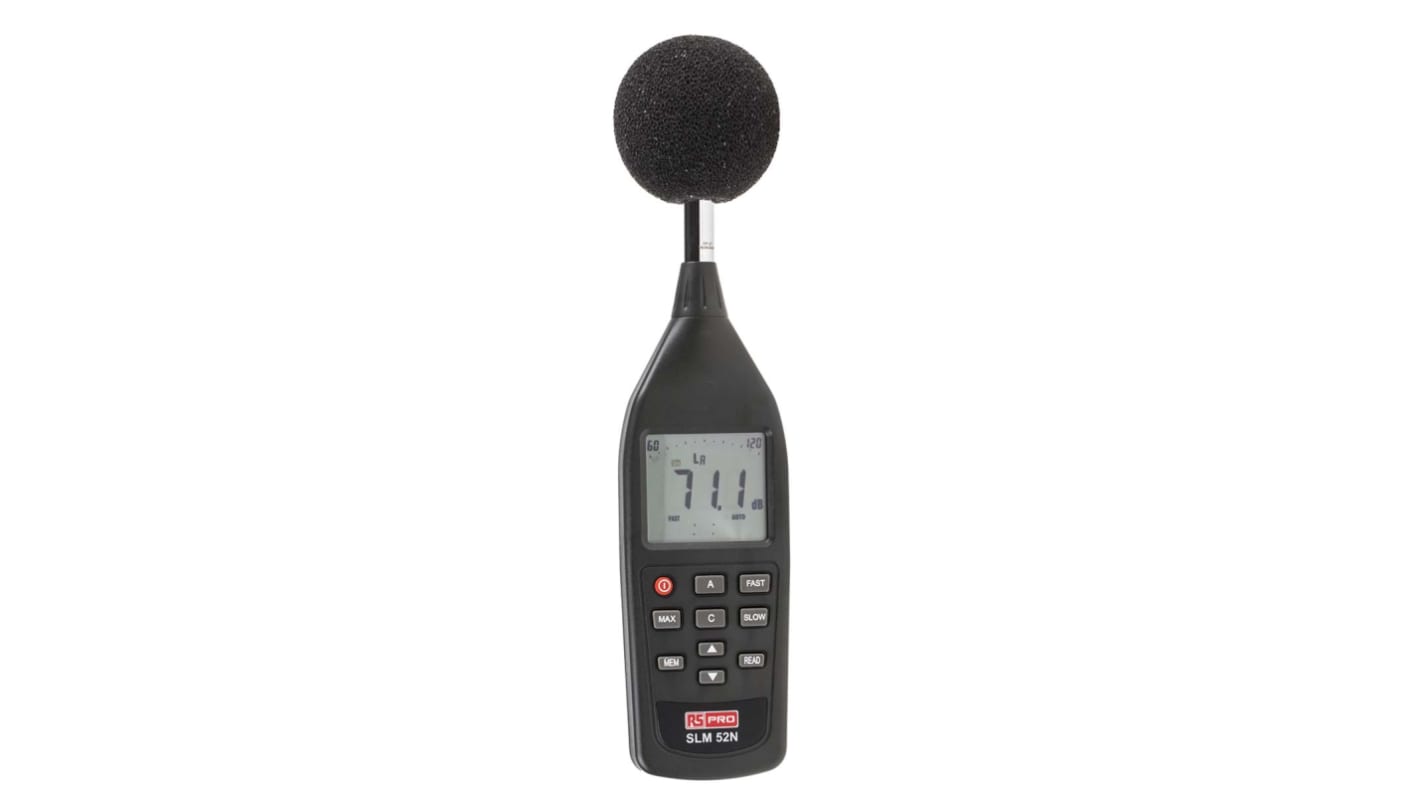RS PRO SLM52N Sound Level Meter, 30dB to 130dB, 8kHz max
- RS Stock No.:
- 123-2225
- Manufacturer:
- RS PRO
Price Each**
Was HK$4,143.55
You pay
HK$1,854.23
26 In stock for delivery within 3 working days*
* Delivery dates may change based on your chosen quantity and delivery address.
FREE delivery for orders over HK$850.00
Units | Per unit |
|---|---|
| 1 + | HK$1,854.23 |
**price indicative
- RS Stock No.:
- 123-2225
- Manufacturer:
- RS PRO
- COO (Country of Origin):
- TW
RS PRO SLM52N Sound Level Meter
From the RS PRO brand, the SLM52N is a great value, easy-to-use sound level meter designed to meet the requirements of health and safety officers for sound level monitoring in industrial and office environments. Both AC and DC signal outputs are available from a single standard 3.5 mm coaxial socket suitable for use with a frequency analyser, level recorder, FFT analyser or graphic recorder.
With a high-quality microphone, this sound level meter is the ideal solution for measuring sound and ambient noise levels in almost any environment.
Features and Benefits
• Large easy-to-read 4 digit LCD display with analog bargraph
• 30 to 130 dB measurement in 5 ranges
• 0.1 dB resolution, 60 dB dynamic range
• A and C frequency weightings
• Fast and Slow time averaging
• Maximum function
• Manual data memory storage and recall of 99 sets of readings
• Analogue output for connection to chart recorders, graphic recorders and other data logging systems
• Battery-powered or external 9V DC input
• Dimensions 264 x 68 x 27 mm approximately
• Weight 260 g approximately, including battery
Applications
This RS PRO digital sound meter, or noise level meter, takes accurate readings of ambient noise levels in an environment. There are several reasons you might want to monitor an environmental noise level- from performance analysis to health and safety concerns. In a factory environment that uses heavy machinery, for example, you might want to know if the environment requires employees to use hearing protection. Alternatively, an entertainment venue might want to measure the noise of its sound system to see if it adheres to local noise level compliance. Digital sound level meters are often used in;
• Car industry
• Mechanical industry
• Leisure and music
What is the difference between Class 1 and Class 2 sound level meters?
Generally, Class 1 noise meter devices are able to measure a wider frequency range than Class 2, and so are more suitable for precision applications. However, for most purposes, a Class 2 device offers a potentially more cost-effective noise measurement solution.
Why RS PRO?
RS PRO aims to be your go-to brand when it comes to reliability, quality, and affordability. We source high-quality tools and parts from trusted sources and employ expert testing to build a brand you can rely on.
When it comes to test and measurement equipment, RS PRO has an extensive range of solutions. From electrical to environmental measurement, we offer calibrated and multi-function instruments to suit your needs.
With a high-quality microphone, this sound level meter is the ideal solution for measuring sound and ambient noise levels in almost any environment.
Features and Benefits
• Large easy-to-read 4 digit LCD display with analog bargraph
• 30 to 130 dB measurement in 5 ranges
• 0.1 dB resolution, 60 dB dynamic range
• A and C frequency weightings
• Fast and Slow time averaging
• Maximum function
• Manual data memory storage and recall of 99 sets of readings
• Analogue output for connection to chart recorders, graphic recorders and other data logging systems
• Battery-powered or external 9V DC input
• Dimensions 264 x 68 x 27 mm approximately
• Weight 260 g approximately, including battery
Applications
This RS PRO digital sound meter, or noise level meter, takes accurate readings of ambient noise levels in an environment. There are several reasons you might want to monitor an environmental noise level- from performance analysis to health and safety concerns. In a factory environment that uses heavy machinery, for example, you might want to know if the environment requires employees to use hearing protection. Alternatively, an entertainment venue might want to measure the noise of its sound system to see if it adheres to local noise level compliance. Digital sound level meters are often used in;
• Car industry
• Mechanical industry
• Leisure and music
What is the difference between Class 1 and Class 2 sound level meters?
Generally, Class 1 noise meter devices are able to measure a wider frequency range than Class 2, and so are more suitable for precision applications. However, for most purposes, a Class 2 device offers a potentially more cost-effective noise measurement solution.
Why RS PRO?
RS PRO aims to be your go-to brand when it comes to reliability, quality, and affordability. We source high-quality tools and parts from trusted sources and employ expert testing to build a brand you can rely on.
When it comes to test and measurement equipment, RS PRO has an extensive range of solutions. From electrical to environmental measurement, we offer calibrated and multi-function instruments to suit your needs.
Standards
IEC61672-1: 2002 Class 2, IEC60651: 1979 Type 2, ANSI S1.4: 1983 Type 2
Supplied with
9 V battery, wind shield, screwdriver (adjustment), plug (3pin AC/DC output), carrying case, user manual
RS PRO SLM52N Sound Level Meter
Attribute | Value |
|---|---|
| Maximum Sound Level | 130dB |
| Minimum Sound Level | 30dB |
| Resolution | 0.1 dB |
| Accuracy Class | ANSI S 1.4: 1983 Type 2, IEC 61672:2013 Class 2 |
| Weighting | A, C |
| Display Type | LCD |
| Battery Type | 9V |
| Maximum Frequency | 8kHz |
| Maximum Operating Temperature | +50°C |
| Minimum Frequency | 31.5 Hz |
| Minimum Operating Temperature | -10°C |
| Model Number p | SLM52N |
| Plug Type | BS 1363 |


